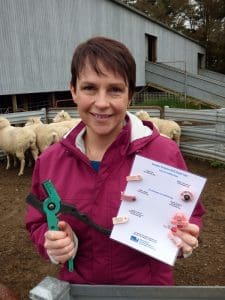
National sheep, goat and wool bodies want Victorian Minister for Agriculture Jaala Pulford to delay mandatory electronic tagging.
AUSTRALIA’S peak wool, sheep meat and goat meat industry councils want the Victorian Government to delay the introduction of mandatory electronic ear tagging in the state.
After January 1, 2017, all sheep and goats born in Victoria will require an electronic identification tag before being dispatched to a saleyard, abattoir or another property.
From mid-2017, all saleyards, abattoirs and knackeries will be required to scan electronic tags of sheep and goats and upload the information to the National Livestock Identification System (NLIS) database.
However, consistent with a recent Australian Livestock and Property Agents Association call for an EID trial to be held in a saleyard, the sheep and goat bodies want the EID introduction delayed to “properly research, design and incorporate new additional infrastructure while modifying that which already exists.”
The peak bodies – WoolProducers Australia, the Sheepmeat Council of Australia and the Goat Industry Council of Australia — have also recommended that electronic identification (EID) for sheep and goats in Victoria remain based on the current mob-based system to ensure harmonisation with the national system and to maintain the integrity of the NLIS database.
This would mean using electronic tags imprinted with a Property identification Code and possibly color-coded according to the year.
The national peak industry councils jointly released their comment on the draft consultation paper “Electronic National Livestock Identification System (NLIS) (Sheep & Goats) – A transition package for Victoria”.
Victorian decision had potential to undermine national system
Sheepmeat Council president Jeff Murray expressed concern that the decision by the Victorian Government to implement mandatory electronic tagging in Victoria outside of the national approach had the potential to undermine the NLIS system.
“This decision is all the more disappointing considering the Victorian Government’s 2014 commitment that they would not mandate electronic identification for sheep and goats,” he said.
The SCA is concerned that the Victorian Government having now made an announcement to implement mandatory RFIDs, is now conducting consultation in an “inordinately unsatisfactory timeline”.
“The short timeframe is completely insufficient to allow identification of the many gaps and inadequacies exposed in the discussion paper, particularly in relation to the logistics and practicalities of implementing this RFID (radio frequency identification) system,” the council said.
WoolProducers Australia president Richard Halliday said the councils recognise the importance of traceability to underpin Australia’s biosecurity, food safety and product integrity systems.
“We have worked hard and have made a significant contribution to the development of a national mob-based identification and traceability system since the introduction of the NLIS in 2005”.
GICA president Rick Gates said the Victorian decision would have an impact on the entire supply chain.
“The proposal raises significant financial and operational implications for both Victorian and interstate producers and the supply chain.
“It also has ramifications for incorporating RFIDs into the NLIS,” he said.
WoolProducers also said the seeming lack of a requirement to report property-to-property movements in the system proposed in the Agriculture Victoria consultation paper was a major flaw. There is also no mention in the consultation paper on how sheep travelling on stock routes are to be treated under the electronic system.
The GICA also said all harvested rangeland goats — as defined in legislation and the NLIS Sheep and Goat Business Rules – that are going direct to slaughter should be exempt from tagging.
A spokesman for Victorian Agriculture Minister Jaala Pulford has said there will be a transition package funding announcement in mid-October to assist with infrastructure for processors, saleyards and producers.
To read the WPA EID submission click here.
To read the SCA EID submission click here.
To read the GICA EID submission click here.
To read the draft standards for the sheep EID consultation click here.

Our industry has so much potential ahead of it. In the not-too-distant future, the current Victorian electronic sheep identification discussion will be viewed for what it is; a storm in a tea cup, pushed by people with self-interest — agents and producers who fear change. The opportunity for industry is a potential game-changer, in terms of linking the quality of what we produce with what processors pay for. Importantly, we will then be able to link what we produce back to management and our genetics on farm. Traceability is important, but the real value gain is how we can create value within the chain. So we need hook tracking and objective carcase measurements driven by forward-thinking leadership. Instead, we hear the agents complaining that they may actually have to do something, and from producer leadership that is more focussed on retirement than on building a future for the next generation by embracing technology that can create value for us. Let’s not miss this opportunity by allowing the agenda being taken by vested interests.
Good question, who wants to know where every mouth full of meat comes from? The consumer wants it, the processors want it and some of our overseas buyers think we already track our animals individually. So who wants to track animals individually? It’s our customers.
I would say to Jaala, ‘well done for being a leader’ and I would say to everybody else ‘get on the bus and embrace the future’. RFID will not bite you, I have used these tags for years. Just get on with it.
So if all the sheep bodies are against this, then who is lobbying for this?